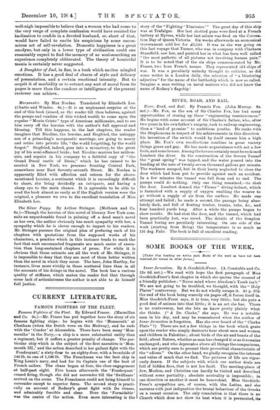NOVELS.
A DAUGHTER OF JAEL.* LADY RIDLEY'S new novel, the appearance of which will excite pleasurable anticipations in those who remember her earlier ventures in fiction, illustrates in a rather curious way the modern practice of employing melodrama, not as an end in itself, but as the starting point of a problem in ethics or psycho- logy. According to the old formula, a murder in the opening chapter sounded a keynote which was religiously maintained throughout. Nineteen times out of twenty suspicion alighted on the wrong person, and the skill of the writer was chiefly exhibited in preserving an atmosphere of suspense, and con- cealing as long as possible from the reader the identity of the real culprit. There was seldom any complexity in the motive of the criminal, who was almost invariably found out and punished in the long run, and the interest of the story resided in the ingenuity with which detection was deferred.
It is hardly necessary to state that such a method of procedure does not commend itself to the author of A Daughter of .Tael. True, the story begins with a murder ; but there is no concealment from the reader of the authorship of the crime, no suspicion attaches to anybody, and though the possibility of confession arises more than once, no in- criminating evidence turns up, and the interest of the narrative is in no way connected with the processes of detection. The situation at the opening of the story is cunningly devised to enlist all our sympathies on the side of the- heroine, a high-spirited girl devoted to her only brother, both pensioners on the bounty of their grandfather, a tyrannical and bedridden miser. The boy is at Oxford, doing well ; but his grandfather, on learning that he owes £100, resolves to remove him from the University. The boy, unhinged by this harsh decision, frightens his sister by threats of following the example of his father, who drank and married a servant, with the result that Frances resolves, as a supreme offering on the altar of sisterly devotion, to rescue him from ruin by hastening the inevitable, chloroforms the old man, and thus secures her brother's immediate succession to a handsome inheritance. In the next act of the drama we find that, judged by the test of results, the removal of the objectionable grandfather has been triumphantly justified. The brother has gone bask to Oxford, completed his academical career with brilliant success, gained his "Blue," entered the House of Commons, and is about to embark on matrimony under the most promising auspices. As for Frances, she has had no reason to repent her " sacrifice " on his score. For herself, she finds the burden of a guilty conscience grow- ing gradually lighter. A crisis arrives, however, when she meets, loves, and is offered marriage by an altogether eligible partner. She develops scruples, and is on the point of confessing their cause, but stifles the cry of conscience, marries, and lives happily with husband and children for several years. Then, misinterpreting her husband's indiscreet compassion for an old friend—a brain- less, sympathetic young widow who has fallen a victim to. the morphia habit to gain relief from chronic suffering--she develops acute and practically homicidal jealousy. The chance discovery that the widow is dying from over-in- dulgence in the drug suggests a solution of the problem, and she is on the point of taking active measures to out short her rival's precarious existence. In the issue while refraining from intervening with a view to prolonging her rival's life, she does all that is possible to restore her when she is already beyond human aid. The curtain falls on the heroine's recon- ciliation with her husband, who convinces her that his affec- tion had never faltered, that his attentions to the widow had. been only inspired by pity, and that her death is an immense relief to him.
The foregoing bald outline of the plot necessarily fails to. render justice to the skill displayed by Lady Ridley in enlist- ing the sympathy of her readers on behalf of her heroine. But her ability in this respect is, after all, a two-edged weapon, for the more successful Lady Ridley is in illustrating the un- selfishness and other admirable qualities of the heroine, the less convincing are those passages in which she is represented as. freeing herself from the burden of remorse. Again, we find it
• A Daughter of /ad. By Lady Ridley. 'London Longuians and Co. 168.
-well-nigh impossible to believe that a woman who had come to the very verge of complete confession would have resisted the inclination to confide in a devoted husband, or, short of that, -would have failed to excite his suspicions by some uncon- scious act of self-revelation. Domestic happiness is a great -anodyne, but only in a lower type of civilisation could one reasonably expect to find the memory of so soul-searching an -experience completely obliterated. The theory of homicidal tnania is certainly never suggested.
A Daughter of Jack in fine, is a book which excites mingled emotions. It has a good deal of charm of style and delicacy of presentation, and a certain emotional intensity. But to acquit it of morbidity or to extract any sort of moral from its pages is more than the candour or intelligence of the present reviewer can achieve..































































 Previous page
Previous page